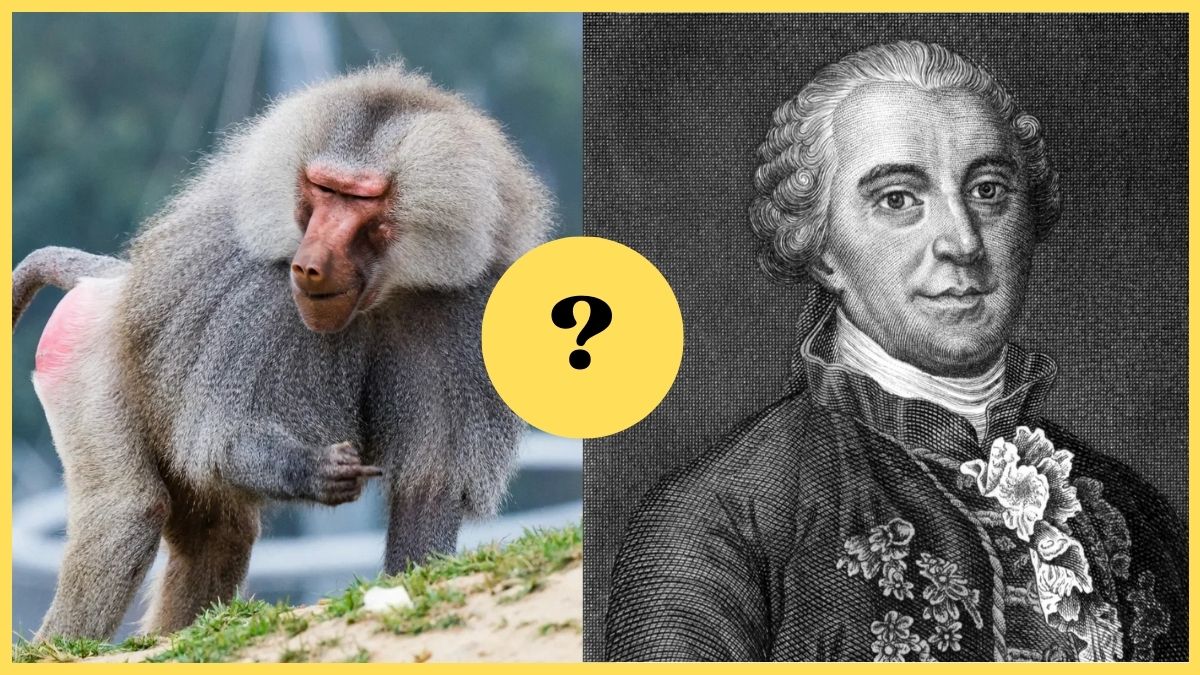The natural sciences are filled with surprising anecdotes. Some stories behind the names of familiar species hide tales of rivalry, revenge, or biting irony. This is the case with the word “baboon,” which, far from being a simple scientific term, has its roots in a personal feud involving one of France’s greatest naturalists: Georges-Louis Leclerc de Buffon. How did a dispute with creditors influence the naming of this primate species? Let’s delve into the intriguing history behind it.
Buffon: The Genius Behind the Name “Baboon”
In the 18th century, Georges-Louis Leclerc de Buffon (1707-1788) was a major figure in French science. The author of the monumental work “Histoire naturelle, générale et particulière” (Natural History, General and Particular), Buffon contributed immensely to the dissemination of knowledge about the animal kingdom. Yet behind the respected naturalist was a man who often faced financial difficulties.
Buffon had accumulated debts with several creditors, one of whom had the notable surname Babouin. Relations between Buffon and his creditors were strained, and the sharp-witted scientist, known for his biting humor, decided to take a unique form of revenge. Instead of settling his debts through conventional means, he used his pen and intellect to retaliate in a subtle and lasting way.
Revenge Through Words
In his encyclopedic work “Histoire naturelle,” Buffon carefully described a group of primates that we now know as baboons. By giving these monkeys the name “babouin,” he played on the phonetic similarity between his creditors’ surname and an old French term.
The word “babouin” derives from the ancient French word “babine,” which referred to a grotesque mask with horns and a beard, often used in medieval ceremonies or comedic plays. These masks mocked exaggerated facial features and those who wore them. By associating this image with his creditors, Buffon delivered a sophisticated insult, linking their name forever with a less-than-flattering portrayal.
With this clever move, Buffon ensured that every mention of the word “baboon” would carry a trace of his personal grievance.
Baboons: Remarkable Primates Despite the Insult
Ironically, baboons (also known by the broader classification term “pavians”) are far from ridiculous animals. On the contrary, they are known for their intelligence, organization, and social complexity.
Complex Social Structures
Baboons live in large, hierarchical groups that can include dozens or even hundreds of individuals. Each member plays a specific role within the group, cooperating to find food, protect against predators, and care for their young. This level of social organization highlights their impressive cognitive abilities.
Bold and Strategic Behavior
Baboons are also known for their bravery and cunning. They will defend their group against much larger predators, such as leopards or lions. Their ability to devise strategies to outsmart threats or find new food sources demonstrates remarkable adaptability.
Playful and Intelligent
These primates are curious and playful by nature. They use rudimentary tools to access food or defend themselves, and their quick learning abilities make them frequent subjects of behavioral and cognitive studies.
An Unintended Compliment?
When Buffon named the species “babouin,” he likely intended it as an insult to his creditors. However, with the benefit of hindsight, the name could be seen as a compliment. Baboons exhibit intelligence, courage, and complex social behaviors, making them fascinating creatures worthy of study.
In a twist of fate, Buffon’s attempt at ridicule ended up associating his rivals with animals that are anything but foolish.
The Word “Baboon” in Everyday Language
Today, the term “baboon” is not just a scientific name but has also entered everyday language. It can be used pejoratively to describe someone behaving clumsily or primitively. Yet this negative connotation contrasts sharply with the actual traits of baboons. This contradiction reflects how words can evolve and change their meanings over time.
A Word, A Story, A Lesson
The story of the word “baboon” reminds us that science, history, and human relationships are often deeply intertwined. Buffon, with his brilliant mind and sharp wit, left a unique mark on zoological nomenclature by turning a personal conflict into an enduring scientific label.
This curious anecdote invites us to look beyond the surface of everyday words and recognize them as fragments of history.
The next time you hear the word “baboon,” you’ll know it refers not only to an intelligent and courageous primate but also to a centuries-old revenge, forever etched into language.

